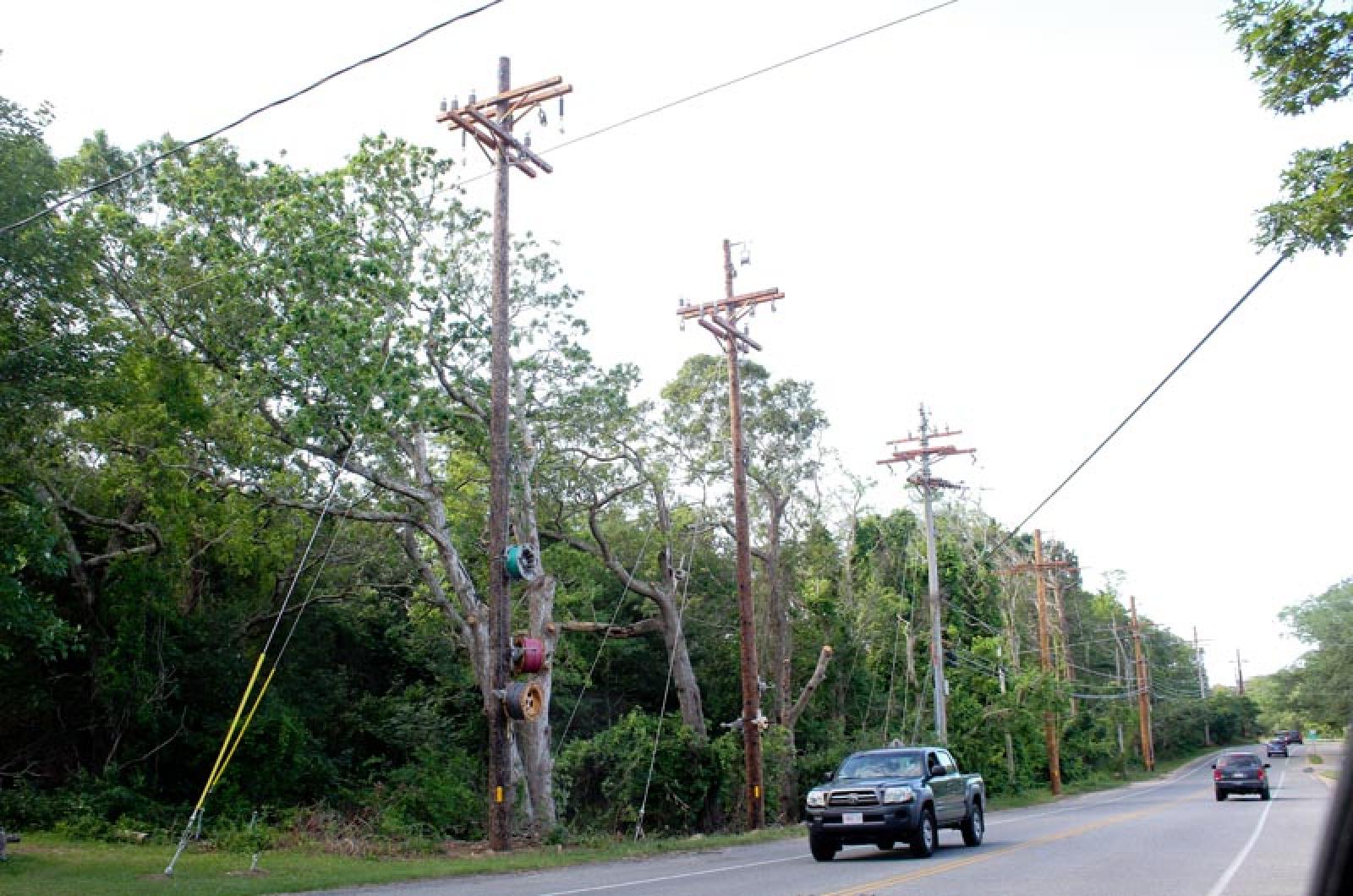Spokesmen for the power company NStar told the Martha’s Vineyard Commission Thursday that they believe the commission has no jurisdiction over a project to install new, oversized utility poles around the Island.
The poles have raised the hackles of Islanders and public officials who say they are ruinous to roadside aesthetics and out of character for the Vineyard.
NStar says the taller, wider poles are needed to accommodate heavier equipment and provide more reliable service.
The Tisbury selectmen referred the project to the Martha’s Vineyard Commission as a development of regional impact (DRI) last month.
A public hearing began Thursday. Commission DRI coordinator Paul Foley said that when the commission approved a new NStar undersea cable, the board was told that two new utility poles would be installed as a result. “They never brought to our attention 44 new midspan poles and bigger poles, so that was news to a lot of people,” he said.
So far, he said, about 156 of 282 replacement poles are in place. The poles have been installed on Edgartown-Vineyard Haven and Edgartown-West Tisbury Roads.
The 44 new midspan poles did have to be approved by local selectmen or state agencies. Mr. Foley said the 19 new poles in Oak Bluffs were approved by the selectmen, and 19 in Edgartown were approved by the state Department of Transportation. Six poles in Tisbury have not yet been approved.
Mr. Foley said NStar has also announced that it will resume spraying herbicides to control vegetation on the poles on the Cape and Islands.
NStar spokesmen who attended the hearing disagreed that the project qualified for commission review. “We have not chosen to come before this board applying for a permit,” senior counsel Jeffrey Stevens said. “NStar Electric does not agree that the Martha’s Vineyard Commission has proper jurisdiction over NStar’s work.”
Mr. Stevens said the work is not a development project as described by the commission. Additionally, he said, pole replacement work does not require town permitting, and permits for the NStar power lines have been in place since at least 1969. He said the permitting process is governed by state law, which states that after grants of locations have been given, no further permission is required to maintain or operate power lines.
Commission executive director Mark London said the commission can review permissions, which are required for the new midspan poles. As for the replacement of existing poles, that is “perhaps open to some discussion” and depends on whether the changes are “reasonable variations or substantial changes,” Mr. London said.
“I think it’s in their interest to take this opportunity to re-explain the project to the Island,” he said. “Hopefully we’ll focus on the substance, the why, the wherefore and set aside the legal issues right now.”
Commission member Brian Smith asked if taller telephone poles were in store for the rest of the Island. NStar representatives couldn’t say for certain, but said no such installation is planned. Commissioners also questioned whether alternate plans were discussed and raised the prospect of putting cables underground. NStar representatives have said that underground installation would be expensive, and the price would be paid for by utility customers not just on the Vineyard but on the Cape as well.
“We did look, obviously, at using existing poles and existing wires,” NStar manager Mark Baldwin said. “That to us was not feasible and not increasing reliability to the Island . . . it’s the right construction and it’s the required construction on a project like this.”
Tisbury selectman Tristan Israel said he was unhappy about the process. “I’m not going to sugarcoat what I feel happened,” he said. “I understand the reality is the poles are probably not going to be taken down, but the process I think was horrendous and somewhat disingenuous. I hope going forward, at a minimum, this doesn’t happen again . . . Some of this or all of it could have been mitigated, and that’s one of the main points.”
Commissioner Linda Sibley took NStar to task for doing work during the summer. “I promise if you came before the commission we would have said, you’ve gotta be kidding me, July? Oh no, no,” she said. “What made you think you had to do this in July of all times?”
The hearing was continued to August 22.







Comments (11)
Comments
Comment policy »